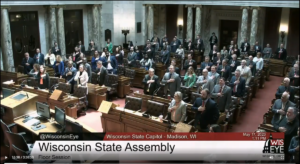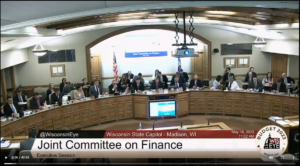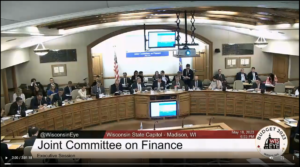
In this update:
- Shared Revenue Bill Updates
- Budget Updates
- Upcoming Events
- Fundraising Opportunities
Shared Revenue Bill Updates
Assembly passes shared revenue bill
On Wednesday the Assembly passed an amended version of A.B. 245, the shared revenue bill authored by Representative Tony Kurtz (R-Wonewoc). The bill passed 56-36 with all Democrats and three Republicans voting against the measure. Key changes within the amended bill include:
- Adding an additional $16.3 million in aid to cities, villages, and towns, and $18 million for counties;
- Removing the complete ban on local advisory referenda and instead only allowing local advisory referenda for capital expenditures funded with property taxes;
- Increasing the maximum number of days a local public health officer can close a business to deal with an outbreak or pandemic from 14 to 30 days before requiring approval from local elected officials;
- Changing the metrics used to determine whether a community is meeting its maintenance of effort spending requirements for police, fire, and EMS services.
Following the bill’s passage in the Assembly, Speaker Robin Vos shared that his caucus was “done negotiating” on the bill despite a spokesperson for Governor Tony Evers saying the governor had not yet signed off on any of the recent GOP amendments. “We are not going to take changes. We are not going to change the bill substantially,” Speaker Vos said. “What we have before us is the deal that we are going to send to our colleagues in the Senate.” The Speaker called the legislation historic, as it is the first time since the shared revenue program’s inception that it will have a dedicated funding source, which means more control to keep property taxes from growing. Speaker Vos concluded with saying the extra money will also ensure local governments can fund emergency services, while prioritizing local spending so it’s “not for a wishlist.” “It’s to expand on the resources for the things that you must do,” Speaker Vos said.
Assembly Minority Leader Greta Neubauer and other Dems said the process was too rushed during yesterday’s floor debate, arguing the GOP bill had too many unnecessary restrictions that would hurt municipalities. Rep. Neubauer said, “our work is not complete.”
Senate GOP weighs in on Assembly bill
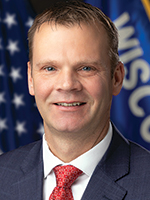 With the Assembly GOP’s shared revenue proposal passing the Assembly Wednesday, the bill now heads to the Senate. Senate Republicans introduced their own proposal to bolster shared revenue on Thursday and now have the option to either amend the Assembly’s version or act on their own bill. However, Speaker Robin Vos (R-Rochester) said the Assembly would not take up a new bill. A key point of disagreement between the Assembly and Senate GOP appears to hinge on whether a county and city sales tax increase for Milwaukee would require approval via referendum or through a vote by the city council and county board. The bill passed by the Assembly requires voters to approve of the sales tax through referendum.
With the Assembly GOP’s shared revenue proposal passing the Assembly Wednesday, the bill now heads to the Senate. Senate Republicans introduced their own proposal to bolster shared revenue on Thursday and now have the option to either amend the Assembly’s version or act on their own bill. However, Speaker Robin Vos (R-Rochester) said the Assembly would not take up a new bill. A key point of disagreement between the Assembly and Senate GOP appears to hinge on whether a county and city sales tax increase for Milwaukee would require approval via referendum or through a vote by the city council and county board. The bill passed by the Assembly requires voters to approve of the sales tax through referendum.
Senate Majority Leader Devin LeMahieu (R-Oostburg) told reporters Thursday that he thought the referendum requirement would not be included in the legislation passed by the Senate. “It likely won’t include a referendum vote, because I think that would not fix the problems in my view, because I think a referendum vote would fail,” Sen. LeMahieu said. “So I think the way to do it is through a vote by the common council and the county board.” Nevertheless, Speaker Vos said removing the referendum requirement could ruin the entire deal and the Assembly would “non-concur” on any legislation that does not include a referendum. “That could unfortunately kill the bill and all of our good work,” Speaker Vos said. “Requiring voter approval for enacting a new tax, which was included in the original Evers proposal, should not be all that controversial.”
Evers signals support for Senate GOP plan
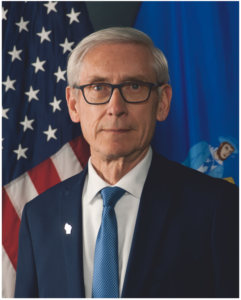 Ahead of Wednesday’s Assembly floor session to vote on the bill, Governor Tony Evers released a statement that he and Republican leadership have been meeting frequently to negotiate. “Today, we are in a much better place than we were just two weeks ago,” Governor Evers stated. “All parties have been willing to set differences aside, all parties have worked to operate in good faith, and all parties have come to the table committed to finding common ground—and for that, I am very grateful.” He further shared that meetings have been focused on increasing aid to local communities compared to the bill’s original plan. “As we continue these important negotiations and conversations in the weeks ahead, I am optimistic and hopeful we can find a compromise that both meets the needs of our local communities and ensures our local partners have more flexibility to make decisions that work for them,” the Governor said.
Ahead of Wednesday’s Assembly floor session to vote on the bill, Governor Tony Evers released a statement that he and Republican leadership have been meeting frequently to negotiate. “Today, we are in a much better place than we were just two weeks ago,” Governor Evers stated. “All parties have been willing to set differences aside, all parties have worked to operate in good faith, and all parties have come to the table committed to finding common ground—and for that, I am very grateful.” He further shared that meetings have been focused on increasing aid to local communities compared to the bill’s original plan. “As we continue these important negotiations and conversations in the weeks ahead, I am optimistic and hopeful we can find a compromise that both meets the needs of our local communities and ensures our local partners have more flexibility to make decisions that work for them,” the Governor said.
On Thursday night, Gov. Evers signaled he would support a Senate GOP plan to remove the requirement that the Milwaukee county and city sales tax be approved via referendum and instead leave it up to the city council and county board to approve. “Gov. Evers agrees with Majority Leader LeMahieu — given Milwaukee’s urgent financial needs, a referendum is likely untenable,” his spokesperson said. “Gov. Evers also appreciates Majority Leader LeMahieu’s willingness to keep working together and looks forward to continuing negotiations.”
What’s Next?
Majority Leader LeMahieu said a Senate companion of the Assembly’s shared revenue bill would likely be referred to committee yet this week. That version does not include the referendum component or the changes that were made by the Assembly in its recent amendment. The Senate can either amend the Assembly’s bill or pass its own bill, but Speaker Vos has said the Assembly would non-concur on any new Senate proposal. Should the Senate pass its own bill and the Assembly does not concur, then the two houses would negotiate via a conference committee to reach a deal on the proposal. Regardless, both houses must pass the same version of the bill before it can go to Gov. Evers’ desk for his signature.
Budget Updates
JFC holds session on courts, public defenders, and DAs
On Tuesday, the Joint Finance Committee held an executive session where they took action on the following sections of the budget: Public Defenders, District Attorneys, Circuit Courts, and the Supreme Court. The committee voted unanimously to increase the hourly pay for state prosecutors and public defenders by $8.76 an hour, resulting in an annual increase of $18,221. Governor Evers recommended an increase of $7.76 an hour. The move also increases starting pay for public defenders and assistant public defenders to $74,880, up from $56,659.
The package comes after multiple budget sessions in which district attorneys, public defenders, the court system, and the state Department of Justice have testified on the necessity of pay increases. According to the Legislative Fiscal Bureau, 22.6 percent of assistant district attorneys left the job in fiscal year 2021 for reasons other than retirement. That decreased to 14.7 percent in fiscal year 2022, but was still nearly double the 7.4 percent turnover rate in fiscal year 2014. For assistant state public defenders, the rate was 23.7 percent in fiscal year 2021 and 18.9 percent in fiscal year 2022, compared to 3.9 percent in fiscal year 2014.
Fond du Lac County DA Eric Tony praised the increase in funding, saying the money would “help recruit and retain amazing prosecutors to help keep our communities safe, working hand in hand with law enforcement.” State Public Defender Kelli Thompson likewise noted the importance of the JFC’s decision. “Being able to recruit and retain the attorneys and staff necessary to ensure the constitutional rights that are protected is a core responsibility of state government,” Ms. Thompson said.
The committee also voted unanimously to approve $3.9 million in program revenue for the state Supreme Court for new and ongoing cybersecurity initiatives and an additional $840,800 in general purpose revenue to increase state assistance to county circuit courts.
JFC holds session on DATCP, Environmental Improvement Fund, and Natural Resources
On Thursday the Joint Finance Committee held an executive session where they took action on the following sections of the budget: Agriculture, Trade and Consumer Protection; Environmental Improvement Fund; and Natural Resources. The committee voted on party lines to approve both majority omnibus motions to adopt various provisions of the budget. On Agriculture, Trade and Consumer protection, the committee notably adopted the following provisions:
- Farmer Mental Health Assistance; Adopt alternatives 1 and 2, which provides $100,000 GPR to support farmer mental health assistance programming.
- Nitrogen Management, Cover cropping, and Producer-Led Watershed Protection Grants: Provide $100,000 non point SEG annually on a one-time basis for the nitrogen optimization pilot program. Increase funding for producer-led watershed protection grants to $1 million non point SEG per year.
On Natural Resources and Environmental Improvement Fund, the committee notably adopted the following:
- PFAS Trust Fund; Create a segregated PFAS trust fund. Transfer $110 million GPR and $15 million environmental management SEG in 2023-24 to the fund.
- Urban Forestry Grants; Increase funding for urban forestry grants by $175,000 each year.
- Law Enforcement Equipment; Provide $76,000 as one-time funding in each year of the 23-25 biennium to acquire AEDs. Provide $120,100 conservation SEG as one-time funding in each year of the 23-25 biennium to acquire and license tasers. Provide $194,300 annually in the forestry general program operations to acquire off-road vehicles for DNR law enforcement officers.
- Campsite Electrification; Eliminate the 35% cap on the number of state park campsites that may be electrified.
Regarding the PFAS Trust Fund, Sen. Eric Wimberger (R-Green Bay) and Sen. Robert Cowles (R-Green Bay) introduced a bill that would need to pass for the PFAS funding to be spent. Democratic lawmakers were skeptical of the GOP motion to create this fund when there is no promise of the money being spent. Senator Wimberger said the Republican approach shows a strong commitment to addressing PFAS pollution and stated, “We need to give ourselves time to find the right solutions.” A spokesperson for Governor Evers disapproved of the idea that Republicans need more time, since the Governor proposed a PFAS action plan in 2020. Senator La Tonya Johnson (D-Milwaukee) reiterated the idea that the effort is useless if the proposed bill is not passed and that Republicans should not congratulate themselves for this effort when they have opposed measures in the past to combat PFAS. “We don’t get to sit here and act like we’re doing the Lord’s work when our constituents and their children are being harmed every single day,” the Senator said. “Whether it’s lead or PFAS, our children are in danger.”
Fiscal Bureau Papers for next week
The Joint Finance Committee will meet next week on Tuesday at 11 AM and Thursday at 11 AM. The committee will cover the following items during their executive sessions:
Fiscal papers for session on Tuesday, May 23:
- Workforce Development — Departmentwide and Vocational Rehabilitation
- Workforce Development — Employment and Training
- Workforce Development — Equal Rights and Employment Regulation
- Workforce Development — Worker’s Compensation and Unemployment Insurance
- Insurance — Agency Operations and Current Programs
- Insurance — Drug Costs and Pricing
- Insurance — Health Insurance
- Veterans Affairs
- Higher Educational Aids Board
- Wisconsin Technical College System
Fiscal papers for session on Thursday, May 25:
- Revenue — Departmentwide
- Revenue — Tax Administration
- Revenue — Regulation of Alcohol, Tobacco, Nicotine Products, and Vapor Products
- Revenue — Lottery Administration
- Wisconsin Economic Development Corporation
- Employee Trust Funds
- Military Affairs
- Miscellaneous Appropriations
Fundraising Opportunities
A list of all upcoming fundraiser opportunities can be found by clicking the button below. For any questions or more information, please do not hesitate to contact your Michael Best Strategies contact.


